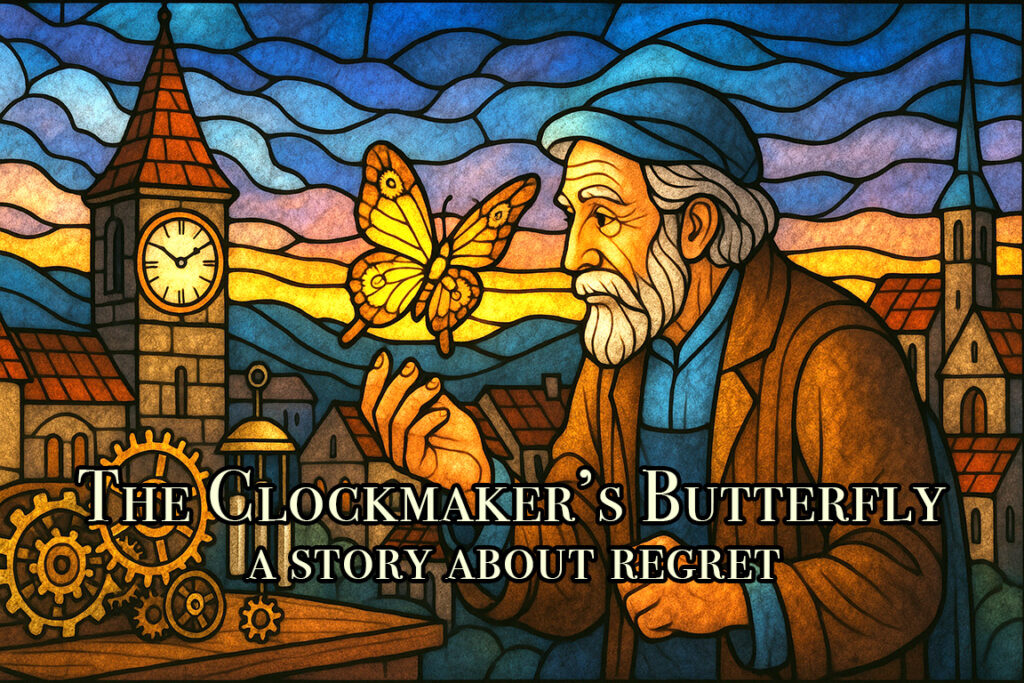The Clockmaker’s Butterfly

In a quiet mountain town lived an old clockmaker named Aurell.
His shop smelled of cedar, oil, and rain — a small universe of ticking hearts.
Each clock he made was perfect Each gear kissed its neighbor with mathematical grace. Each chime rang pure as temple bells. All ticking in perfect harmony.
Until one spring morning.
Aurell was high in the city’s great tower, replacing the great clock’s mainspring, when a gust of mountain wind burst through the belfry. His fingers slipped. A single brass gear—no bigger than a coin, warm from his palm—tumbled through the air, struck the floor once with a bright ping, and rolled into the darkness between the ancient floorboards.
Gone.
He replaced it with another — close enough, almost right — and the tower clock went on ticking.
And The sun went on to paint the valley gold each morning. The baker went on to open his doors when the clock struck six. The children still went on to school at the quarter bell. Life went on, obedient to the clock’s call.
No one noticed.
No one But Aurell.
With every swing of its pendulum, the Great Clock ran a fraction of a breath too fast.
Every day, villagers would pause beneath the tower, faces upturned in wonder. “Beautiful as always, Master Aurell!” they’d call. “The finest clock in all the valleys!”
And Aurell would smile tightly and say, “Thank you,” while the word imposter burned in his chest like hot coal.
He felt as if he’d hidden a secret beneath the floorboards with that gear.
And each day that passed, it grew heavier in his heart.
Sometimes he’d lie awake at night, imagining how things might have been if only….
Perhaps the clock would have sung in perfect time with the wind.
Perhaps travelers would have said, “This is the village where time itself is pure.”
Perhaps he would have been remembered forever.
And in that ‘if’, he built himself a cage.
One evening, as he sat at his bench polishing an old pocket watch, a small butterfly fluttered in through the window. This was no ordinary butterfly i’ll tell you that.
Its wings were patterned like tiny gears, shimmering gold in the lamplight, and it spoke!
“Why do you sigh so deeply, old one?”
Its voice was like wind through glass chimes.
“Because one mistake that changed everything.”
The butterfly’s wings opened and closed thoughtfully. “Everything? Tell me—what changed?”
Aurell opened his mouth, then stopped. He realized with a chill that he didn’t actually know. He had imagined ten thousand versions of what might have been, but could not name a single true thing that had changed.
“You don’t really know, do you?” the butterfly asked gently.
“No,” Aurell admitted. “Not really.”
“Would you like to know?”
Fear tightened in Aurell’s chest. “For what? I’m certain anything would have been better than living with this regret. Knowing will only deepen my misery.”
“And do you know that for sure?” The butterfly tilted its head. “Or is that, too, another imagination you’ve built?”
Heat rose in Aurell’s throat. “What do you want from me? Did you come to punish me for one mistake? I’ve punished myself enough.”
The butterfly’s wings stilled. “Oh, old one, you misunderstand. You are already doing a magnificent job of deepening your own sorrow. The cage you live in? You built it yourself, from the iron of perhaps.” It lifted into the air, hovering before him. “I came to offer you a key—if you want it.”
“There is nothing I want more,” Aurell whispered. “But how?”
The butterfly’s wings began to spin. Faster. Faster still. The air rippled like water struck by rain, and the workshop dissolved into light.
Aurell gasped.
He was young again. His fingers held tight. The gear did not fall. He placed it perfectly, and when the pendulum swung, it sang with such pure tone that birds stopped mid-flight to listen.
Villagers gathered, weeping at its beauty. Travelers came from distant lands. His name spread like wildfire. Aurell. Aurell the Master. Aurell the Perfect.
But the vision did not stop there.
He watched himself work harder, sleep less. His eyes grew hollow with ambition. When his apprentice made a tiny error, Aurell dismissed him with cold words. The boy left weeping.
More visitors came, but Aurell could not hear their praise over the roar of his own expectations. He polished and refined, adjusted endlessly, chasing impossible perfection.
One by one, people stopped coming. His harsh words, his obsession, his refusal to accept anything less than flawless—they drove everyone away.
The shop grew silent. Empty. The perfect clock ticked in its tower, but below, Aurell sat alone in the dark, surrounded by his perfect work, with no one left who cared to see it.
The vision shimmered. Faded. The workshop returned.
Aurell sat very still. Speechless, processing the vision and its implications. What would have truly happened if…
The butterfly nodded.
“Every wingbeat changes the air, old one. You imagine a world that might have been better — but it never existed. You regret what is inifable.”
“Inifable?” Aurell asked.
“It means what cannot be known, because it never was.”
The butterfly’s voice softened. “Your burden is built from air. Yet you carry it as if it were made of stone.””
Aurell looked toward the tower through his window. Its pendulum swung, steady, one heartbeat ahead of the rest of the world.
And for the first time in years, he didn’t feel the urge to climb the stairs and fix it.
Instead, he took the broken, leftover gears from his bench and strung them together into a small wind chime.
When the mountain breeze passed through, it sang an uneven, beautiful song — not perfect, but alive.
And every so often, when the tower clock chimed, the wind answered with a laugh of metal and wind —
one tick early, one note late,
and all of it… perfectly in time.
